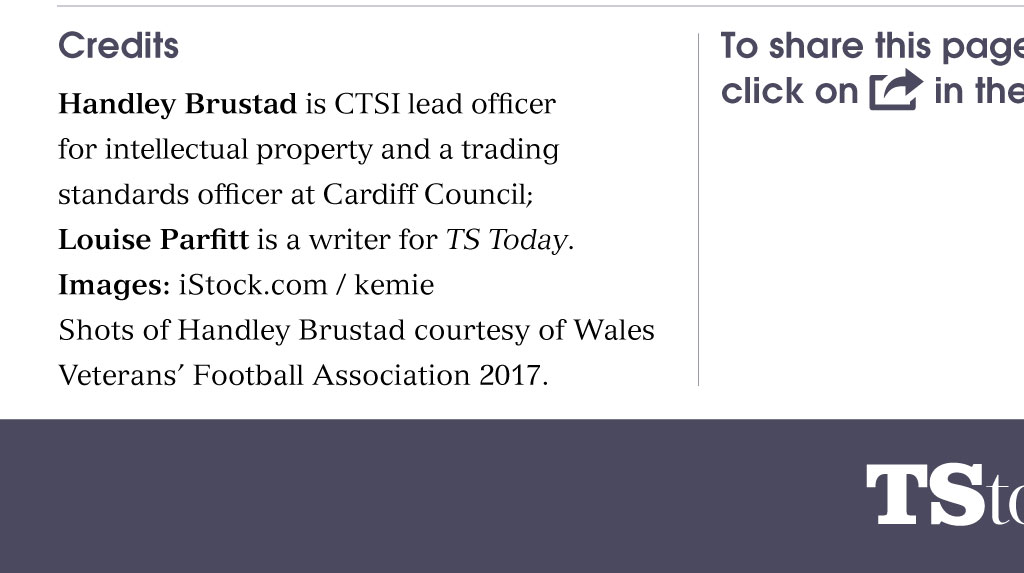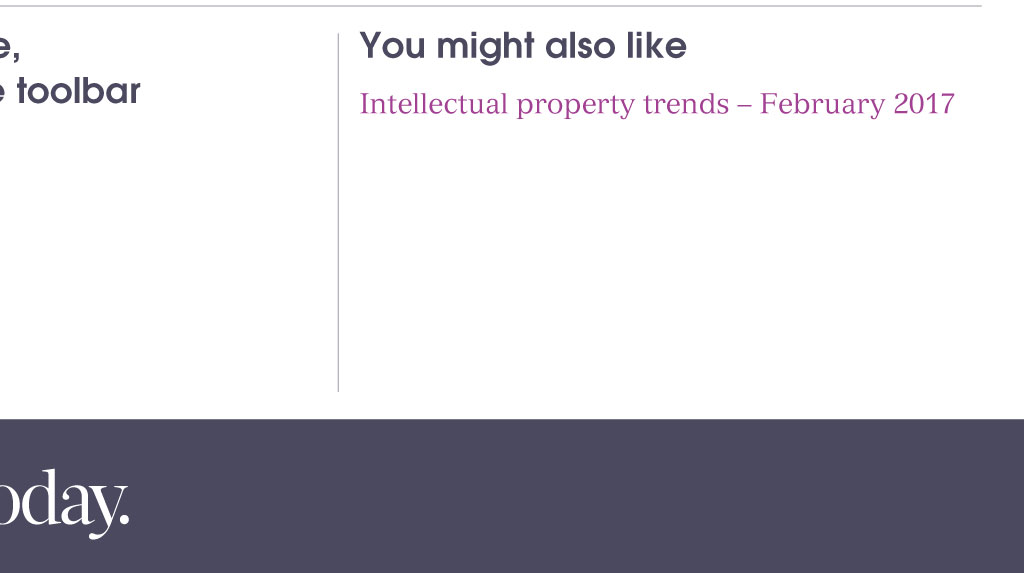
























Handley Brustad on 50 years in trading standards | life passion | intellectual property | the beautiful game In this feature game on Next year, Handley Brustad celebrates 50 years service to the profession. Louise Parfitt found out what kicked off his life-long passion and was surprised to discover it all comes down to the beautiful game Where were you born? Handley Brustad: In Newport, and I went to a Catholic primary school run by nuns we certainly knew what discipline was then! What attracted you to trading standards? HB: I was studying for A-levels in maths and physics. However, by Christmas time, everyone I was friendly with had left to get jobs, and I was feeling at a loose end. I used to play football for various teams, including my elder brothers side. One of their players was SteveDelahaye, who went on to become CTSI chairman. He was working in Newport at the time, as an assistant for a weights and measures inspector. I saw a job for an assistant advertised in Monmouthshire, so asked Steve about it. He explained about the job which seemed to fit in with my interest in maths and physics and said there were opportunities to take exams and become an inspector yourself. So, I went along for the interview and Ive been in the profession ever since! What was it like when you first started work? HB: We only had four pieces of legislation to enforce, so that was a big difference compared to nowadays! I started the same year that the Trade Descriptions Act 1968 was introduced, so I was there from the very beginning of that. There were some odd inspectors back then, many of whom took great delight in pulling you up on what you didnt know, rather than trying to encourage you. But most of them did have a sense of humour. We were out every single day there was very little time spent in office, and very little paperwork. Who has influenced you during your career? HB: In Monmouthshire, I had a lot of encouragement from Barry Protheroe who later became chief of Blaenau Gwent and chief inspector Terry Crook, who gave a lot of the training on different subjects to prepare us for the exams. We only had four pieces of legislation to enforce, so that was a big difference compared to nowadays When did you become interested in intellectual property (IP)? HB: In the late 1980s. One of my first cases of note was in 1989, when I was asked to look at a dispute between two companies Polo Ralph Lauren and the Polo Company concerning their logos. Pretty much the only difference between their logos was that the polo player on the horse was facing the opposite way. Under the legislation back then, it was allowed, because the law only applied to items that were identical. In 1994, however, the new Trade Marks Act came into force, and the law changed to apply to items identical or likely to be mistaken for another so that altered the game entirely. What has changed in terms of IP issues? HB: Some of the items have changed for example, when I started, it was all about CDs and video cassettes. Today, anything goes, from cigarettes to razor blades, perfumes, hair straighteners you name it, ifthey can reproduce it cheaply then they will. What have been your more memorable moments? HB: When Wembley shut for rebuilding and we hosted lots more of the games here in Cardiff. We had the FA Cup and League Cup finals, the play-off finals that was full on, because you were having to deal with big events on a regular basis. What are the biggest challenges you face today? HB: At the end of events be they sporting games or pop concerts the police want to get everyone out as swiftly and safely as possible. Often, the unlicensed sellers put their stuff in stairwells and along the roads; they dont care about safety they are just trying to sell their goods as quickly as they can. When its dark and you have no police help, it can be really difficult to apprehend them. Some will pick up their stuff and run, but weve had people throw it up in the air and say all these are free!. Of course, then the public go mad for the free items and it becomes chaotic. But, in all the years, I only remember two occasions of physical assault. What are the biggest changes youve seen? HB: Technology and the internet. We now have counterfeit goods sold on social media and there are these big fulfilment houses popping up its one big circle to catch up all the time. The fraudsters seem to be better and quicker with technology than we are. Also, we havent yet seen the full impact of 3D printing. As soon as people realise what they can do with that, we will see huge IP problems. How can we prevent counterfeit goods sales in the future? HB: How we convince the public to change their attitude to buying fake goods is a real issue that needs to be looked at. Going into schools to try to influence children from an early age is one idea, but weve never quite managed to get it into the curriculum. What do you think are the challenges and opportunities facing the trading standards profession today? HB: I am not really sure where trading standards is going at the moment. We are so fragmented across so many authorities that we are really not capable of doing the job we should be doing. Perhaps we should be a national service? That way we could move resources to where they are needed. If we move to, say, one trading standards service for Wales, one for Scotland, one for Northern Ireland and because of its size perhaps four for England, then we might have a future. If we remain in local government, I think we will go down and down already our standing within local authorities is not what it was. The budgets just get cut and cut and cut. Were not well off now if they continue to cut, there is nowhere for us to go, because we will just not have the money to be able to do anything. Someone has got to sit down and come to terms with this, and say: This is our 10-year vision, and this is what we are going to attempt to do. Football got me into this job and it has come full circle now I am back playing How do you relax? HB: Ive gone back to playing football! I retired to the sidelines when my children were growing up, to support them, but I am not very good at just watching I prefer to be out there on the pitch. So I play veteran football in an over-50s league, and I play for Wales over-60s and over65s. Now my family are cheering me on from the sidelines. Football got me into this job and it has come full circle. What would you like to do with your next 50 years? HB: I dare say it will be based around football! Ive been a Leeds United supporter since the 1960s and Im also a Newport County fan, so theres always plenty of cheering on, as well as the playing. Do you have any advice for officers who are just starting out? HB: Dont always wait for permission to do something. If its on your warrant, get on and do it and put the time in to do it properly. You willusually get good results and you can hardly be criticised for doing the job youre supposed to be doing! I accept its more difficult these days, because times are tight, but my attitude has always been to just get on with it. Credits Handley Brustad is CTSI lead officer forintellectual property and a trading standards officer at CardiffCouncil; Louise Parfitt is a writer for TS Today. Images: iStock.com / kemie Shots of Handley Brustad courtesy of Wales Veterans Football Association 2017 To share this page, in the toolbar click on You might also like Intellectual property trends February 2017